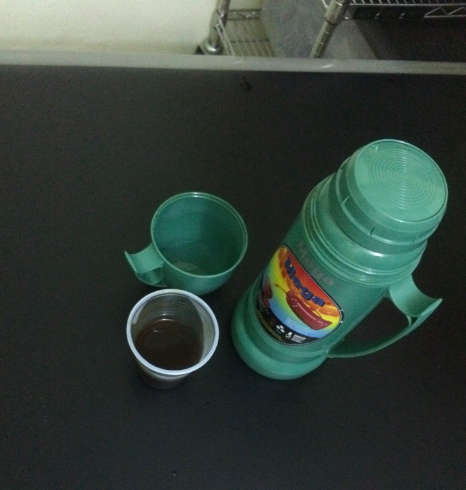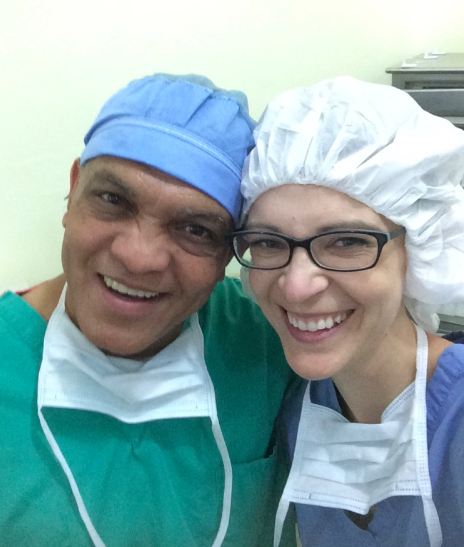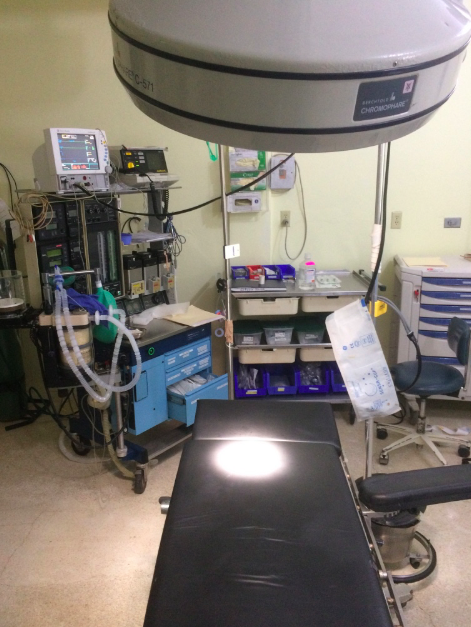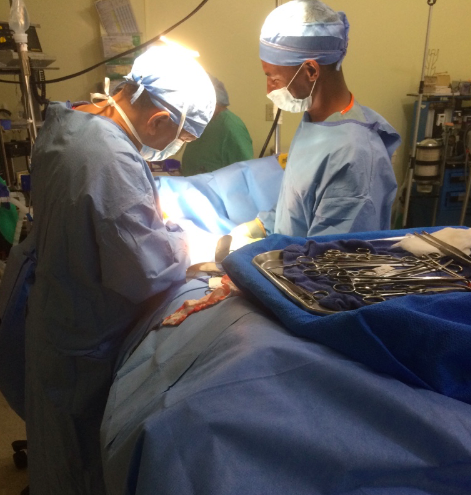day five in the dominican republic: she kept screaming
The evening before Thanksgiving, I went to the hospital next door to the guest house where the team was staying, and I assisted in several surgeries. The surgeon that day was a man in his early 50's. In between cases, we went to a small storage room off the main operating room, and he opened a thermos he'd brought with him that held espresso-strength Dominican coffee. He poured us each a small cup full of the warm, sweet black liquid.

As we sipped from our cups, we had a conversation -- with him speaking slowly in Spanish and me trying to translate his words to English with my very rusty language skills.
He told me he'd been a surgeon for 24 years. And that he preferred surgery to food.
"I'd rather operate than eat," he said, with a sparkle in his deep brown eyes.
I found out later that he jogs every morning because he wants to stay healthy enough to provide surgery for fellow Dominicans for at least two more decades.
That afternoon, I assisted him as we removed gall stones, two diseased ovaries, a kidney stone and a fibroid-ridden uterus. He was a skilled surgeon, with hands that deftly removed organs, ligated blood vessels and sutured incisions.
As is the case in much of the developing world, the anesthesia of choice is not general anesthesia, which requires intubation. It's an epidural, which numbs patients from the chest down but leaves them conscious and breathing. It's less expensive than general anesthesia, it requires less equipment, and it's safer because patients can protect their own airway.
I also learned that because patients pay out-of-pocket for their medical care, most surgeries are not done laparoscopically (where the surgeon makes three one-inch incisions to insert a camera and thin medical tools); they're done the way we used to do surgery decades ago in the U.S., with a large, open incision that requires no video monitor or special tools.
"It's cheaper this way," the surgeon told me, as he made the six-inch incision to remove a patient's gall bladder.

The following day, on the morning of Thanksgiving, I spent a few hours counting pills and packaging up 30-day supplies of medicine in the hospital's pharmacy, which we'd use the next time we went into the barrios.
That afternoon, I scrubbed in for another surgery. A woman in her mid-50's was scheduled to have a hysterectomy and a tummy-tuck (which, in medical terms, is called an abdominoplasty). The surgeon explained that their small hospital did a lot of tummy tucks because the patients who could afford to pay for them were often wealthy, and the fee kept the hospital afloat financially so they could afford to provide surgical care for patients who were less well-off.

The anesthesiologist on Thanksgiving was a tall man in his late 40's -- the hospital's main anesthesiologist -- who had been off the day before.
He placed the epidural, the surgeon and I scrubbed in, and he made the 9-inch vertical incision from the woman's navel to her pubic bone.
And then, 20 minutes into the surgery, when he had dissected her skin, subcutaneous fat and abdominal muscle, the woman began to moan.
The surgeon kept going, until the patient's intestines were spilled out across her belly and he was digging in her pelvis, searching for her uterus.
In a matter of seconds, the woman went from moaning to yelling to screaming. The epidural hadn't been placed properly, so she wasn't completely numb.
In fact, she could feel everything.
She was eviscerated on the operating table, her arms and legs tied down, and she could feel everything.
Even though I'm not fluent in Spanish, I understood her screams.
"It hurts, it hurts, it hurts!"
"I can't take it any more!"
"Help me, help me, help me!"
Her arms thrashed as she fought the restraints, trying to get off the table.
If that had happened in the U.S., the anesthesiologist would have quickly sedated the woman, intubated her, and gone with general anesthesia, in which the patient is completely unconscious.
Instead, the anesthesiologist in the OR that day gave the patient several medicines in her I.V. that did little -- if anything -- for pain. He gave her Reglan, which is for nausea and vomiting. Then he gave her Dexamethasone, a steroid that works for inflammation but also does nothing for pain. Then he gave her I.V. Ibuprofen -- a mild anti-inflammatory that wouldn't touch the pain of having your abdomen cut open and your intestines displaced.
Before he gave her the Ibuprofen, he showed me the bottle and asked what dose he should give her. "We don't have I.V. Ibuprofen in the U.S.," I told him. "We only have pills. And besides, it isn't strong enough for her."
He drew up the entire bottle in a syringe -- with ten times the recommended dose -- and pushed the whole thing into her I.V.
The woman kept screaming.
Finally, after she'd been screaming and fighting the restraints for nearly 20 minutes, an aide went to the adjacent room and got a bottle of Propofol, a potent sedative. The anesthesiologist drew up the entire bottle into a syringe, plunged it into the woman's I.V., and in a matter of seconds, the woman mercifully drifted off to sleep.
And then, because there was nothing protecting her airway, she began snoring, her tongue fell to the back of her throat, and her oxygen saturation dropped down to 88, then 76, then 69% (normal is above 94%).
The anesthesiologist watched the numbers plunging and did nothing. Just when I was about to rush the head of the bed and begin bagging the woman, the anesthesiologist finally turned on the oxygen and began delivering slow, steady breaths to the woman until her sats came up to the 90's.
Once she was asleep, the surgeon decided to just do the tummy tuck and leave the hysterectomy for another day.
As I watched him sew up her abdomen, I wondered how the woman would feel when she woke up, and what she would think of her experience. I thought about how, if this had happened in the U.S., the anesthesiologist would likely have a lawsuit on his hands. I thought about the tens of thousands -- no, millions -- of people in the developing world who suffer because they can't afford adequate medical care, and because the providers who care for them are often aggregiously under-educated and under-trained, as in the case of the anesthesiologist who gave ibuprofen and nausea medicine to a woman in mind-numbing pain.

And I wondered how long it will take before we begin to love our neighbors as ourselves.
Before we extend to them the same level of care -- and pain control -- that we expect for ourselves and our loved ones.
Before we acknowledge that people in the developing world endure an unjust and unnecessary amount of suffering.
Before we hear their cries and answer them with education, resources -- and mercy.
